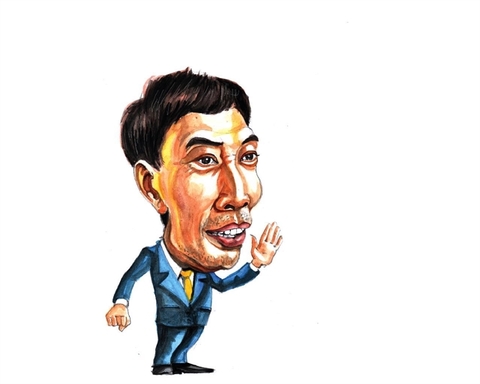
*Võ Trí Thành
Vietnamese people have just concluded the nine-day Tết holiday and returned to work on Monday. As enterprises are accelerating their business activities to offset the stagnation during the fourth wave of COVID-19 infection last year, many people voiced their concerns such a lengthy holiday right after the western New Year celebration is too long and affected their business plans.
The debate whether Tết (Lunar New Year) is still right in the modern age or should we combine lunar and solar new year festivities as a way to boost productivity and reduce waste is not new and often raised ahead of this holiday every year.
Việt Nam is among only six countries celebrating the Lunar New Year in the world, along with China, the Republic of Korea, North Korea, Singapore and Mongolia. This is considered the biggest festival in Việt Nam in terms of both tradition and economic opportunity.
Officially, Tết is a three-day celebration but along with lengthy preparations, the holiday could stretch up to over a week (including one or two weekends).
Opponents of the holiday said Việt Nam should join the modern world to celebrate a single New Year holiday on its way of international integration. They cited the example that Japan switched to western New Year celebrations since 1873 and took advantage of more working days to boost labour productivity to make the economy the second largest in the world (now it’s the third-largest).
Many beautiful traditions are also becoming less cherished.
Tết is an important family reunion in a year, especially for migrant workers and the Vietnamese abroad, but in big cities in recent years, many families have chosen to travel outward during this holiday instead of staying at home and visiting relatives.
Besides, there are several cultural values that have been distorted and reversed in a bad direction such as superstition, excessive spirituality and corruption on this occasion. Although the Government has been pushing for a more simple holiday with the order that officials cannot visit or bring gifts to superiors, bribery through the form of Tết gifts has not disappeared.
In terms of economics, many people have argued that Việt Nam’s labour productivity remains low compared to many countries in the region so a long break during Tết pushes productivity even lower in the first quarter. The fact is that GDP growth and manufacturing expansion is often low in the first three months of the year.
Enterprises, especially the ones in export processing zones, industrial parks and factories in big cities, often struggle getting workers back to work after Tết as many apply for a longer holiday or even quit jobs to stay in their hometown to participate in many local spring festivals.
This year, many businesses are expected to face a more serious shortage of workers after Tết due to the impact of COVID-19 pandemic control in cities and provinces.
Some experts reckoned the impact of the long holiday is not only seven or nine days, but can last for three weeks, including one week before the holiday, main week and the “lazy start” week after Tết which could cost the economy 2-5 per cent of GDP.
However, for those who support to preserve the Vietnamese traditional holiday, Tết is an important tradition of the nation that mirrors Việt Nam’s distinct culture and could not be skipped. This is an occasion to promote sharing and friendship and an important family reunion for people far from home.
Tết holiday is also an opportunity to develop the economy because it helps boost spending and stimulate tourism. This is the biggest spending season of the Vietnamese people thanks to the tradition of gift-giving, drinking and dining with friends and family, and decorating the home for the holidays.
Although economic growth and production in the first quarter are usually low, increased production for Tết consumption is an important reason to push up GDP in the fourth quarter. There are a number of industries that also benefit from this occasion such as services, tourism, accommodation and retail.
To date, the Government has never discussed merging the two holidays but greater flexibility for employers in using labour or flexible holiday periods should be brought forward to make it adaptable to new normal situations.
There is no official simulation showing how one single New Year holiday will affect economic growth. Also, no one can say for sure one holiday will improve labour productivity and make people happier.
One certain thing is that if businesses pay workers well enough and offer good allowances, workers will stay at enterprises and work through the holiday. Thus, the use of employees or giving short or long breaks should be based on consensus between the company and employees to keep business running and avoid stagnation.
Around the world, working hours tend to decrease along with higher productivity. Holidays are necessary for workers to recharge and be more productive. In Việt Nam, workers are entitled to have 25-28 days off (of which 18 are public holidays) per year. Thus in the longer-term, the long holiday should not focus on Tết alone and the Government can add more days off to other important holidays in the year.
In fact, experts believe the essence of the problem is not how long the holiday is but a solution to increase productivity, and thinking of “long break”, “spring play” which only exists in backward agricultural production should be eliminated.
A much more important thing is that Tết is not just about a beautiful tradition, but also about how to make it become a symbol for national creativity and vitality.
*Võ Trí Thành is a former vice-president of the Central Institute for Economic Management (CIEM) and a member of the National Financial and Monetary Policy Advisory Council. The holder of a doctorate in economics from the Australian National University, Thanh mainly undertakes research and provides consultation on issues related to macroeconomic policies, trade liberalisation and international economic integration. Other areas of interest include institutional reforms and financial systems.
- Reduce Hair Loss with PURA D’OR Gold Label Shampoo
- Castor Oil Has Made a “Huge” Difference With Hair and Brow Growth
- Excessive hair loss in men: Signs of illness that cannot be subjective
- Dịch Vụ SEO Website ở Los Angeles, CA: đưa trang web doanh nghiệp bạn lên top Google
- Nails Salon Sierra Madre
 VnExpress News The News Gateway of Vietnam
VnExpress News The News Gateway of Vietnam





